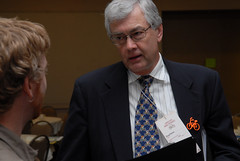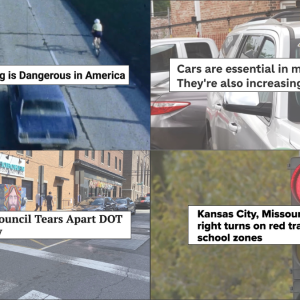
at a press conference for
the bill last June, lost her husband
due to a careless driver.
(Photos © J. Maus)
At a work session of the House Judiciary Committee in Salem today, the BTA’s Vehicular Homicide Bill (HB 3399) was withdrawn from the agenda, thereby terminating its chances to become law this session.
According to BTA Legislative Committee Chair Doug Parrow, the bill was pulled because it has a fiscal impact (not good when the the state is facing a $4 billion budget gap) and there were “complications with the legal approach”.
House Judiciary Committee Chair, Rep. Jeff Barker (D-Aloha), made the decision, but not without first acknowledging the work of the BTA and Mary O’Donnell.
O’Donnell is the widow of Tim O’Donnell, the man who was killed in June 2007 while riding his bike on a rural road in Washington County. The woman that hit O’Donnell, 28-year old Jennifer Knight, was driving on suspended license and was cited at the scene for careless driving.
Mary O’Donnell has become a vocal advocate for bike safety since her husband’s death and she testified in Salem on behalf of this bill several times. On April 3rd, she testified in front of the Judiciary Committee on what would have been her and Tim’s 51st wedding anniversary. She said:
“Unlicensed and uninsured drivers are a danger to everyone on Oregon’s roads… It is inexcusable and unacceptable for the state to continue to allow them to flaunt the law and to endanger everybody else who is using our roads.”
Parrow, who was at the work session today, told me via telephone that Rep. Barker “recognizes this is a serious problem” and that he intends to work with O’Donnell and the BTA in the coming months and years to develop a “much stronger bill” for next session.
With time running out on the legislative session, a bike-related bill that has complicated legal language and a fiscal component was not the highest priority for legislators.
The BTA’s legal experts hoped this bill would fill in the gap between the very high threshold of guilt needed to convict someone of Oregon’s existing criminally negligent homicide statute and people whose combination of dangerous behaviors while operating a vehicle warranted a more serious consequence than Careless Driving.
The woman who hit and killed Tim O’Donnell was involved in a separate crash in Idaho six days prior to the one that claimed O’Donnell’s life. Investigators found that her “inattentiveness” was a contributing factor to the collision. According to the lawyer representing Mary O’Donnell, Knight pled “no contest”, never had to appear in court, and sent in a nominal fine in the mail.
Oregon remains only one of four states without a vehicular homicide law (the others are Alaska, Montana, and Arizona).
— Browse our “Vehicular Homicide Bill” tag for more stories on this topic.






Thanks for reading.
BikePortland has served this community with independent community journalism since 2005. We rely on subscriptions from readers like you to survive. Your financial support is vital in keeping this valuable resource alive and well.
Please subscribe today to strengthen and expand our work.
Wow, I had no clue of that:
Too too bad it’s dead for now. I’m sure there’s plenty of other battles still being fought on bills that have a fiscal impact so I don’t know how I feel about that as an excuse to pull it. Granted, if it was going to receive no support because of the fiscal impact, I suppose it was prudent. I still don’t like it.
I don’t buy the “legal complications” bit if the bill is modeled after existing ones in nearly every state in the country.
This is about money – and I hope it serves as a wake-up call to everyone who may have idealistically thought the bill would pass due to its focus on improving justice.
We need to organize better and push twice as hard next time to have a chance with this bill. I also hope the BTA devotes more resources to it – I see this issue as much more important than convenience bills such as the Idaho Stop.
How terrably sad that Oregon still fails to protect vulenerable users of the road.
SHAME ON YOU!!! Those of you who killed this bill! We’re supposed to be the state that bikes dream of? What in Nightmares?
#2 the bta legislative committee devoted more resources to this bill than any other this session. While the media chose to focus on the Idaho Stop bill I would say the BTA was more focused on this bill.
Ironically the Idaho Stop law probably had a better chance of passing due to the extreme difficulty of passing any bill this session that has a negative impact on the state’s budget. Since the Idaho Style bill had no fiscal impact to the State it did not need to clear that hurdle.
Bjorn
Can’t you offset the fiscal impact with a provision requiring confiscation and sale of the perpetrator’s vehicle under civil asset forfeiture procedures?
I realize a vehicular homicide law is still needed but was there a civil case filed for wrongful death?
speechless.
how does our state’s government expect to reasonably encourage travelers to “Ride Oregon” when we show absolutely no interest in investing in their safety?
pisses. me. off.
I will be remembering the names of those committee members during the next election cycle….a promise.
Please tell me, what is the “highest priotity” for legislators this session?
apparently not my life….
Nominal fine? That’s insane.
I haven’t been paying enough attention to this issue, but I always wonder about this hypothetical situation: let’s say I’m using dangerous machinery in a dangerous way, like I’m inattentively juggling chainsaws on a crowded sidewalk. And let’s say because of my inattentiveness somebody dies. Wouldn’t I be hauled off to jail for this? Wouldn’t the repercussions be severe? I would think so. Then why is it any different if the dangerous machinery has wheels? Or is it?
I still have a hard time with the wording and argument for this law…
If a distracted, yet licensed and insured motorist runs a red light and strikes me, causing loss of life and/or limb to my person, are they somehow less culpable because they’re paid up to the insurance cartels?
Of course her actions warranted a more serious consequence than careless driving, but was the fact that she had no insurance somehow a contributing factor to the accident?
If she would have been in the possession of a valid operators license, would Mr and Mrs. O’donnels loss been somehow reduced?
Some recovery from a supposed insurance company may have mitigated the loss of income, but since unlicensed and uninsured drivers (in addition to being irresponsible) are often poor, the likelihood of any meaningful recovery from a civil suit is more than likely nil (been there, tried that), not to mention Oregon’s liability insurance requirement of $50,000 per person would pay for about 20 minutes in the trauma center at OHSU. (it is estimated that the individual cost of a severe head injury is approximately $3 million)
And I’m not for one second buying the “if they wouldn’t have been driving without insurance, they wouldn’t have hit someone” argument. Is someone attempting to give credence to the argument that if we didn’t ride our bikes on the road, we shouldn’t expect to be hit by cars? For while this is also true in an absolute sense, it is so unrealistic that it must be rejected outright as a subject for debate.
If we want inattentive drivers to be punished for negligent homicide, it should be because their negligence caused the death, not because their insurance policy happens to have lapsed.
Oliver,
I don’t believe this law is as much about insurance or financial liability as it is about civil penalties for causing the death of someone. I’m ashamed our state is still so backwards as to not pursue the strongest form of punishment available for this type of crime. Excuses have long been used to perpetuate ill behavior that endangers the life of the oppressed and bicyclists have long been oppressed in this and other states since the advent of the automobile and the subsequent treatment of bicyclists as a second-class culture..
This news comes just as another bicyclist dies on our city streets.. Quite the shame we should be feeling for our city and state that a life, even just one life, isn’t considered worth the time and effort to pass a just version of this law.
disappointing…
can we list the committee members so we can vote them out?
In my unsolicited opinion, BTA is drifting into complete and utter uselessness. Can someone please explain to me what they have successfully accomplished in the past 18-24 months?
I just sent my grievance to Representative
Jeff Barker, as well as alerted my corporate clients.
/////
Hello,
I am very disappointed in your decision to kill HB 3399,
Your argument about financial implication impeding the bill is tenuous at best.
ONe reasonable solution would be to simply confiscate the drivers car, and I am certain you can recoup the fees.
Monetary implications to refuse the bill are ridiculous as well, if you are reckless and harm people, you should be dealt as such.
Should we reconsider or dismiss non-vehicular manslaughter charges for fiscal reasons?
Clearly not.
My company generates a large amount of tax dollars to the city and the state.
Several of my corporate clients and friends have vowed to vote you out the next election cycle.
They are also educating their employees on your political missteps.
This blatant disregard for vulnerable road users and auto centric mentality is not absorbed lightly.
Thanks you for your time.
Destin Young
Actually, Montana and Arizona both have vehicular homicide statutes; Oregon and Alaska do not.
ScottG, #2:
This bill is not modeled after existing statutes in nearly every state– although nearly every state has a vehicular homicide statute, there are widely varying standards for what constitutes Vehicular Homicide.
Still, one thing that is unequivocally true– Oregon’s legislators and prosecutors have no stomach for prosecuting drivers who kill.
Well said Oliver #10. In my opinion this bill would have had unforeseen/’un-cared-about impact on poor people in Oregon. It would have also disproportionately affected men too, as they are more likely to have sanctions against their Driver Licenses. …and on, and on…
It’s already a crime to accidentally hurt some one in this state. It is already a crime to operate a motor-vehicle without the proper authority to do so. Clearly the system determined this horrible incident was accidental, I guess I just don’t understand pursuing it any further than that.
Life contains risks. At SOME point certain people are going to have to meet society half-way and shoulder this responsibility themselves. Frankly, this bill failing is better than the oppressive Nanny-State alternative where every one is constantly required to, “Please display your papers”.
I remain terribly sorry for these folks and their loss. I’ve lost friends to traffic accidents, as well as a few close calls myself. I have every sympathy… However, poverty is not a crime, and should never be criminalized.
Oliver, #10–
You’ve identified what think are he weak points of this bill. I do think that one could make a straight-faced “but for” argument– “but for” the driver being on the road, the accident would not have occurred. That said, you are right– there’s no qualitative difference between a licensed driver who kills, and an unlicensed driver who kills.
While I’d very much like to see a Vehicular Homicide statute in this state, I’d like to see one that addresses the real problem– vehicle operators who kill others by operating their vehicles in a negligent manner.
Vance, #16:
Life contains risks. At SOME point certain people are going to have to meet society half-way and shoulder this responsibility themselves.
What are you talking about? Are you REALLY going to blame the victims here?And while you’re pondering that one, try reading up on the difference between a “nanny state” and a state that protects its citizens from people who kill other people.
“According to BTA Legislative Committee Chair Doug Parrow, the bill was pulled because it has a fiscal impact (not good when the the state is facing a $4 billion budget gap) and there were “complications with the legal approach”.” J Maus/bikeportland.org
What were the complications with the legal approach that Doug Parrow was thinking of? I would imagine that on a fundamental level, the public would be far more receptive to a law addressing the issue recognized by the Vehicular Homicide Bill, than it was the Idaho Stop for Oregon law proposal.
People in general readily recognize the havoc that lamebrain motor vehicle drivers can have on vulnerable road users and other road users as well. Decisive measures to get these drivers off the road are desperately needed.
It doesn’t seem unreasonable to think that the bill’s failure was due in part to budget concerns, but if the bill’s legal approach…its wording, implications, etc…had problems, that’s sounds like a bigger reason the bill failed. If the bill can be well written, it should pass in some form. It’s just unfortunate that this didn’t happen in time for the ’09 legislative session.
Easy now Rixtr #18. You’ve restated my position incorrectly, and subsequently weakened it. If this was intentional, then you are creating a straw-man argument. My original position places no blame, on the victim or otherwise. My opposition to this poorly written bill is not de-facto support for mayhem.
A state protecting it’s citizens from rational, avoidable risks is a good thing. This is not the case with this bill. This bill’s intent is to add an, “extra-bad”, clause to the existing legislation (Pardon my speculation here). A punitive measure that will severely impact thousands of people. For what?
People are still going to have accidents. People are still going to die. The ONLY difference this bill would make is to further harangue illegal Mexican immigrants, non-custodial fathers, ethnic minorities et al, and a slue of other state citizens.
The anti-car hype here (On BikePortland) could be construed as anti-poor people, folks. Forget the definition of, “Nanny State”, for a moment Rixtr. Forget this horrible tragedy that is the topic. What are the statistics on monthly income differences between those who own and operate a motor-vehicle, and those who don’t? Um, ya.
The drive to make driving insufferable is only working on people who can’t afford to just pay whatever for gas, or insurance, and registration. People are going to drive. Period. No matter what we do, no matter who it hurts. The driver who killed Mr. O’donnel was not in compliance with some laws. Any number of laws. Presumably, they’d have violated the one proposed as well.
Nanny-State, by the way Rixtr, is a pejorative, and as such, means whatever the heck I want it to mean, whenever I want it to mean it. Nice semantic attack though, it went nicely with your straw-man. The straw-man, followed by the ol’ F.U.D.. Bush-league, and I resent the baseless attack. We just disagree.
The principle behind this bill is sound. I also admire Ms. O’Donnel and her actions. In the end it doesn’t afford any one any more, or less, protection though, and it certainly would have a far reaching, negative, impact on the poor. When a state attempts to implement safety features that don’t protect any citizens, that only effectively criminalizes an entire demographic, well that’s a NANNY STATE if there ever was one!
the “fiscal note,” as they sometimes call it, seems to be the fact that police would be required to administer some kind of test (apparently a cheek swab) to determine whether the driver was intoxicated, and of course this costs money. but it seems to me perfectly reasonable to spend money on investigation of a crash resulting in serious injury or death. whatever.
it does seem a little odd to lump the unlicensed and the uninsured in with the impaired (intoxicated, distracted, asleep at the wheel) in defining the crime of vehicular manslaughter, but it does bear noting that people with licenses and people with liability insurance are in fact statistically safer drivers . . .
“nanny state” is when the state refuses to penalize a motorist for injuring or killing someone because, god forbid, it might mean taking someone’s license away.
Are there any bike shops in Jeff Barker’s district in Aloha?
If there are, then the BTA would be smart to contact them and ask them to put up signs and notices for their customers to vote Barker out.
Are there any bicycle clubs in Aloha? The same could go for them as well.
Surely, there must be bicycling community in that district. Lets use that community to put pressure on Barker.
The BTA could also do a targeted mailing of its members in Barker’s district for the same effect. That’s one thing that the BTA can do with minimal cost.
Vance,
If I restated your position, it was unintentional.
That said, your words were “Life contains risks. At SOME point certain people are going to have to meet society half-way and shoulder this responsibility themselves.” Taken in context, a perfectly reasonable reading of your words would be that you are saying that cyclists should accept that life has risks, and that they should accept some responsibility for that. If that was not your intended meaning, it is certainly the meaning your words conveyed.
And speaking of the meaning of words, if you wish to assign any meaning to “nanny state” that you choose, that is your prerogative, I suppose, but people who know what the term actually means will know you’re misusing the term. Think of it this way—I can claim that a bicycle is a 4-wheeled vehicle powered by an internal combustion engine, and with an enclosed cab area for seating the driver and passengers. Despite my claim that “bicycle” can mean whatever I want it to mean whenever I want it to mean that, people who actually know what a bicycle is will know that I’m misusing the word.
Those points notwithstanding, I think a proper vehicular homicide statute would make the act of killing the crime, rather than making meaningless distinctions between drivers who kill. I think the important legal principle here is that nobody should escape justice.
All that said, if somebody has had their license suspended or revoked, or is too poor to afford insurance, or functioning pollution control devices, that person has no business operating a motor vehicle, period, and should be removed from the roads, and I think if a driver is uninsured, or unlicensed, and kills somebody, there’s no rational reason that driver shouldn’t face an enhanced penalty for killing when they weren’t even supposed to be on the road.
#16, who cares if the bill would have disproportionally impacted poor people and/or men? If it causes some people to drive more carefully, I believe it’s a good thing regardless of impact. I’m a lefty who really dislikes regressive bills–but when it comes to car use, the more and harsher regulation, the better!
Keep after them Doug!
are said, “the ‘fiscal note,’ as they sometimes call it, seems to be the fact that police would be required to administer some kind of test (apparently a cheek swab) to determine whether the driver was intoxicated, and of course this costs money. but it seems to me perfectly reasonable to spend money on investigation of a crash resulting in serious injury or death. whatever.”
I read somewhere else that the real fiscal impact of this bill would have been the expense of housing more people in jail, which is where they would end up in cases where a “nominal fine” wasn’t enough.
It is pretty sad, though, that if you want to kill a cyclist in Oregon, all you have to do is run over them and then claim to investigators, “sorry, I must have been inattentive.” It might cost you a few hundred or even a thousand dollars, but that’s still probably way cheaper than trying to hire someone…
Shoudn’t even matter if we have a new law. What about just applying the old law that states, if you kill someone, it’s is a serious offense that the DA needs to investigate and follow?
The worst thing in this country right now, imho, is not that we don’t have enough laws, it’s that the laws we have are applied selectively. That starts at ignoring both the Federal and State constitutions all the way down to civil codes. Absolutely maddening!
I agree with # 28 — this is less an issue of legislation and much more an issue of enforcement.
As long as traffic laws are enforced selectively, adding a Vehicular Homicide bill to the books won’t solve the problem — it will simply be another law that can be enforced selectively.
I’m also in some agreement with Vance (#20). When you are a bike rider in a car-centric world, you are automatically in the minority whether you like it or not. You want to ride a bike in this country, you have to accept that you will be tilting at windmills now and then.
Assume that if a car driver hurts you, you will have to work harder to prove it because you’re a bicycle rider in a car-centric universe. And then suck it up and Just. Work. Harder. Period.
#28 The reason for this bill is that the current law requires a very high standard to convict someone. This standard is very difficult to show and in general when prosecutors have tried juries refuse to convict. This bill would have created a lower standard for people who already had their licenses suspended or were driving without insurance since often dangerous drivers are uninsured because insurance companies drop them before the state actually suspends their license.
Ray Thomas can correct me if I am not stating it exactly but I believe the difference in legal standard is instead of having to be reckless these drivers would only have to be careless, and that is as it turns out a really big deal.
Bjorn
Thanks for nothing (again), BTA and Oregon state reps.
**A sentence of this comment has been deleted by moderators due to inappropriate content.**
The interns are now moderating, look out here come the brownshirts. lol
What happened to my husband on June 9th 2007 should not have happened to him or anyone riding a bike. When this Vehicular Homicide Bill gets passed, and I know that it will, I will know that something positive has taken place not just for Tim, but all the biking community.
I want Tim’s memory to stay alive until 2011 when we can attack this Bill again.
I need all your help to get this done. If enough people call or email their Representatives in Salem, and tell them how important this is to them personally, They Will Listen
The Vehicular Homicide Bill momentum is only going to get stronger and we need to keep it alive.